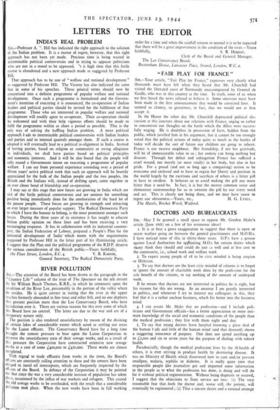INDIA'S REAL PROBLEM
LETTERS TO
THE EDITOR
Si,—Professor A. Hill has indicated the right approach to the solution of the Indian problem. It is a matter of regret, however, that this right approach has not been yet made. Precious time is being wasted in interminable political controversies and in trying to appease politicians who are not in a mood to be appeased. 't is high time that this futile course is abandoned and a new approach made as suggested by Professor Hill.
That approach has to be one of "welfare and national development" as suggested by Professor Hill. The Viceroy has also indicated the same line in some of his speeches. These general terms should now be concretised into a definite programme of popular welfare and national development. Once such a programme is formulated and the Govern- ment's intention of executing it is announced, the co-operation of Indian leaders and political parties should be invited for the fulfilment of that programme. Those who are interested in popular welfare and national development will readily agree to co-operate. Their co-operation should be welcomed and with their help vigorous efforts should be made to fulfil the programme within as short a period as possible. This ig the only Way of solving the baffling Indian problem. A mere political approach Irads to interminable political controversies with Indian leaders and parties and to internal quarrels amongst them. If such a course is adopted it will eventually lead to a political re-alignment in India. Instead of having parties, based on religion or community or owing allegiance to individuals, we shall have parties based on political principles and economic interests. And it will be also found that the people will rally round a Government intent on executing a programme of popular welfare. I can say from personal experience extending over a period of fifteen years' active political work that such an approach will be heartily appreciated by the bulk of the Indian people and the two peoples, the British and the Indians will, Instead of drifting apart, come together in an ever closer bond of friendship and co-operation.
I may say at this stage that new forces are growing in India which are sick of the futile political controversies and are anxious for something positive being immediately done for the amelioration of the hard lot of the poorer people. These forces are growing in strength and attracting an ever larger measure of popular support. The Radical Democratic Party to which I have the honour to belong, is the most prominent amongst such forces. During the three years of its existence it has sought to educate Indian public opinion on these lines and has been receiving a very encouraging response. It has in collaboration with its industrial counter- Part, the Indian Federation of Labour, prepared a People's Plan for the industrial development of India which meets with the requirements suggested by Professor Hill in the latter part of his illuminating article.
I suggest that the Plan and the political programme of the R.D.P. deserve the serious consideration of the British public.—Yours faithfully,






















 Previous page
Previous page